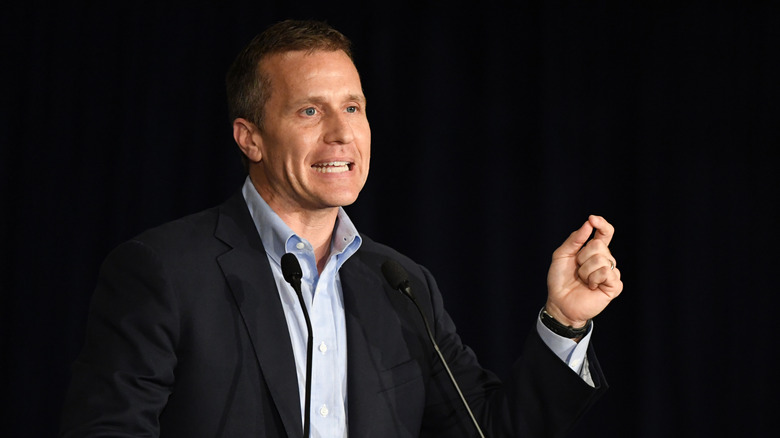Eric Trump's Cancer Charity Controversy Explained
Eric and Lara Trump's insanely lavish life is constantly in the news, drawing both criticism and praise. Many say the two found success because of family connections rather than hard work — and some of their business activities are under legal scrutiny. For example, Eric Trump's cancer charity is being investigated for misusing donor funds. The money was supposed to help children with cancer, but the Trump family reportedly used it for personal gain.
Established in 2007, the Eric Trump Foundation has raised funds for St. Jude Children's Research Hospital, a nonprofit facility dedicated to pediatric cancer research. St. Jude has been helping children with brain tumors, leukemia, and other deadly cancers since 1962, changing thousands of lives for the better. The organization received over $2 billion in donations in 2021 alone, but its operating costs are significant.
Eric Trump redirected the funds to other charities, potentially misleading donors about how their money would be spent. But, according to Forbes, many of those charities were connected to the presidential family.
The Eric Trump Foundation turned out to be a family business
In 2019, former U.S. President Donald Trump had to pay $2 million to eight charities after being accused of misusing the funds raised by his foundation. His son, Eric Trump, followed in his footsteps and shifted over $500,000 to charities supporting his family's interests. Additionally, donors were misled into believing their money would be used to support St. Jude. "If you are raising money for X, and you give it to Y, that is fraud, even if Y is a charity," said James Fishman, a Professor of Law Emeritus, in an interview with Forbes.
The Eric Trump Foundation allegedly redirected the funds to more than 40 charities unrelated to cancer research. For example, $15,000 went to a non-profit organization dedicated to helping children born with facial deformities. Another $25,000 was paid to a charity supporting artists, and more than $60,000 was directed to animal welfare organizations. The foundation also donated to the American Society for Enology and Viticulture and other so-called charitable causes, including golf courses and tournaments.
Forbes was the first publication to tell the truth about the Eric Trump Foundation, triggering a spiral of events with legal consequences. In 2016, Eric told The Washington Post that he'd no longer accept donations. But even so, he has had enough time to fund his family's lavish lifestyle and build even more wealth.
Eric Trump has denied all claims, but the numbers don't lie
Donald Trump's son started the Eric Trump Foundation to leave a legacy and help those in need. Sadly, he changed his intentions over the years and seemed to choose to put his well-being over everything else. Not only did he allegedly misuse the funds received, but also may have made false claims in an attempt to raise more money. For example, Eric Trump tweeted that he raised $16.3 million for St. Jude between 2007 and 2016. The charity confirmed his claims, but the tax records tell a different story. As it turns out, the actual amount was less than $10 million.
Following these events, Eric Schneiderman — the former Attorney General of New York — began to investigate the foundation in 2017. The ex-president's son has denied all claims but still chose to cease fundraising. "While I resigned with a heavy heart, it was a voluntary decision to enact these measures during the tenure of my father's presidency in order to avoid the appearance or assertion of any impropriety and/or a conflict of interest," he wrote on the organization's website (via CNN).
The Eric Trump Foundation was rebranded as Curetivity, but its mission remains the same: To help children with cancer and raise awareness for this disease. Today, the organization is led by entrepreneur Thomas M. Sparico and has different governance rules, including a whistleblower policy. Simply put, its employees can report any illegal or suspicious activity to their immediate supervisors without facing repercussions.

